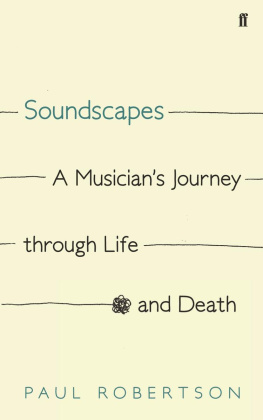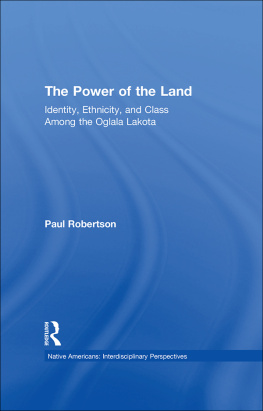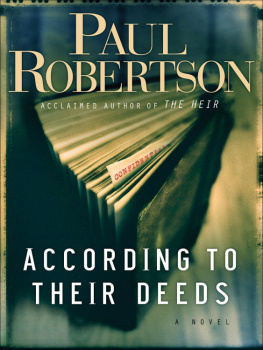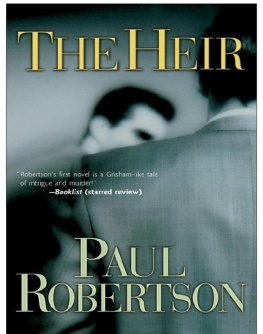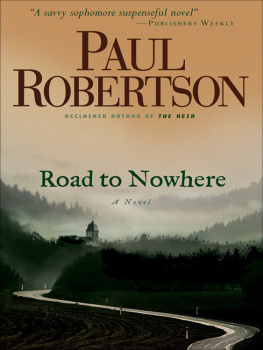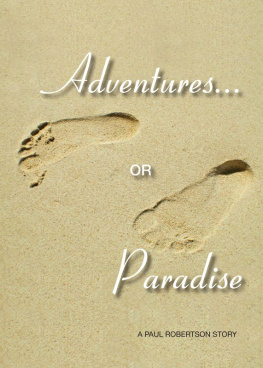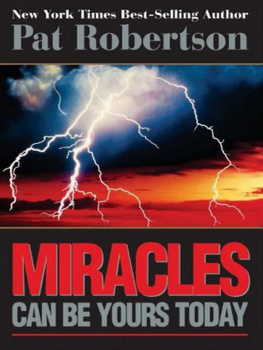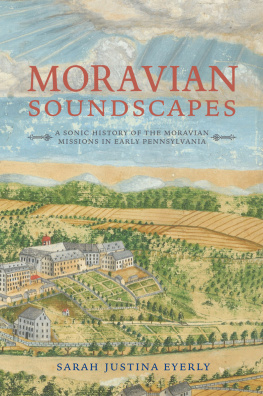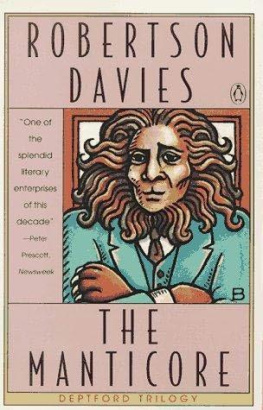Paul Robertson - Soundscapes: A Musicians Journey through Life and Death
Here you can read online Paul Robertson - Soundscapes: A Musicians Journey through Life and Death full text of the book (entire story) in english for free. Download pdf and epub, get meaning, cover and reviews about this ebook. year: 2016, publisher: Faber & Faber, genre: Religion. Description of the work, (preface) as well as reviews are available. Best literature library LitArk.com created for fans of good reading and offers a wide selection of genres:
Romance novel
Science fiction
Adventure
Detective
Science
History
Home and family
Prose
Art
Politics
Computer
Non-fiction
Religion
Business
Children
Humor
Choose a favorite category and find really read worthwhile books. Enjoy immersion in the world of imagination, feel the emotions of the characters or learn something new for yourself, make an fascinating discovery.
- Book:Soundscapes: A Musicians Journey through Life and Death
- Author:
- Publisher:Faber & Faber
- Genre:
- Year:2016
- Rating:3 / 5
- Favourites:Add to favourites
- Your mark:
- 60
- 1
- 2
- 3
- 4
- 5
Soundscapes: A Musicians Journey through Life and Death: summary, description and annotation
We offer to read an annotation, description, summary or preface (depends on what the author of the book "Soundscapes: A Musicians Journey through Life and Death" wrote himself). If you haven't found the necessary information about the book — write in the comments, we will try to find it.
Soundscapes: A Musicians Journey through Life and Death — read online for free the complete book (whole text) full work
Below is the text of the book, divided by pages. System saving the place of the last page read, allows you to conveniently read the book "Soundscapes: A Musicians Journey through Life and Death" online for free, without having to search again every time where you left off. Put a bookmark, and you can go to the page where you finished reading at any time.
Font size:
Interval:
Bookmark:

To Chika, Thas, Caspian and Calista,
and Mum and Dad
What do we mean by death? No respiration, no heartbeat and no brainstem reflexes have long been the clinical criteria of death. The brain in this state cannot maintain consciousness or store memories, so one cannot either experience or remember experiences. This state is known to be irreversible after about five minutes, although by cooling the patients brain immediately the heart stops, to reduce the brains need for oxygen, brain function can be restored after up to half an hour without a heartbeat. However, it is known that although consciousness is reversible at this point, this procedure might lead to some degree of brain damage.
But our understanding of the process of dying is challenged when we study the accounts of people who do report experiences during cardiac arrest when their heart has stopped and they have no respiration, no heartbeat and no brainstem reflexes, when they are, in fact, clinically dead. Such experiences are called near-death experiences (NDE). About 10 per cent of all cardiac-arrest patients report fairly detailed phenomena during a near-death experience. Another subset of patients will say they had some experiences during this time. It is now generally accepted that near-death experiences during a profound coma when there is no heartbeat and to all intents and purposes the patient is clinically dead can occur. This makes our understanding of the difference between life and death, from a physical point of view, much more complex.
In this fascinating and enormously insightful book Paul Robertson describes what he experienced in the state between life and death. During a lengthy operation to repair a tear in his aorta, Paul was under a general anaesthetic and unconscious. His heart was stopped and his head cooled to prepare his brain for a period of oxygen starvation.
Paul is very clear about what happened to him. While deeply unconscious, he moved from the full awareness that he was dying, to experience of the potential unification of his consciousness with that of the universe: As I lay there waiting, I felt myself die beautifully, ecstatically, transcendently. I saw eternity and shed the whole of myself joyfully in order to become unified with it.
This is only the beginning of his journey. It is common in near-death experiences for the experiencer to come to a border and realise that if he crosses it he will not return. He might be turned away by relatives who say he still has work to do, or by the Being of Light, the Divine essence of the universe, which sends him back as it is not his time.
Why did Paul, who had seen the transcendent aspect of the universe, its love, its warmth, its bliss, and was doing all he could to join it, decide to come back and rejoin the living? This is not made explicit, but it is evident that he chose voluntarily to return. He describes his return journey in the deepest and most fundamental layers of his mind, up through his psychology, to his final awakening from coma. The understanding that he gained from these experiences of himself and his life, is illuminating for us all. In this book he travels through all the major events of his life and analyses and re-evaluates each of them. One can sense his psychological growth and understanding, his change in maturity, the lessons he has learned and how he has been guided by a universal impulse towards a unity.
Nothing in this state is linear. For time as we know it is different at this level of consciousness. Fragments of Pauls experiences arose, were integrated, only to fall away again and be replaced, maybe by an earlier formative experience, or by a later more major resolution of the causal processes within him which led to the difficulties he had had. He gives insightful accounts of key moments in his musical history, how he met his first violin, how he realised he was musically gifted, how from an early age he saw blocks of his life sketched out in front of him which would lead to a final understanding of musical creativity. His experience while unconscious shows how he stumbled through these, but was always driven to achieve perfection. Few of us can look back on our lives with such insight into our own motivations and how these have led to the successes and failures that we have had. This process is the preparation for death as the ego is cleansed and slowly crumbles, the final freedom.
Throughout this time his wife Chika and his family visited, and Chika continually played CDs she knew were meaningful to him. The family prayed for him and asked him to return, and this was the touchstone that decided him. If there is a next time and he is called beautifully, ecstatically, transcendently to merge with the universe, he will be able to decide to go with the knowledge that his family is reconciled to his decision and can accept his departure.
One morning at the end of March 2008, as I was shaving in the bathroom of our West Sussex farmhouse, the main artery from my heart ruptured. I felt it snap. Although I didnt realise it at the time, I was dying.
I staggered into the living room, lay down on a sofa and cried out to my eldest daughter. Then I passed out. An ambulance crew arrived and I can remember insisting to them that, although it hurt, the pain wasnt as bad as when Id had gallstones some months before. I was rushed to hospital, swinging in and out of consciousness.
Many hours later, the registrar told me that since the blood tests confirmed I hadnt had a heart attack I was about to be discharged. Just to be on the safe side he was going to scan my chest. As he was connecting a small device to his laptop, he chatted away with the banter doctors typically employ to distract their patients. He told me he just needed to exclude one rare condition that he had seen only once before. This procedure had previously been carried out by specialist technicians and he apologised for taking so long to get the scanner working. Suddenly he froze, then ran the scanner twice more over an area of my upper chest and commanded me not to move on any account. He made it clear that my situation was very critical indeed. He sprinted off to phone my wife Chika and one of the only two surgeons in the country who could perform the operation I needed.
I went back to drifting gently, as if lying in a punt:
Row, row, row your boat,
Gently down the stream.
Merrily, merrily, merrily, merrily,
Life is but a dream.
The doctor told my wife that my chances of survival were very slim. There was a tear in the wall of the aorta, the major artery carrying oxygenated blood from my heart. At that time, fewer than 3 per cent of patients with this condition survived and most of those that did were left brain-damaged, seriously physically maimed, or both.
Some time later he interrupted my reverie to tell me my wife was on the phone, wanting to speak to me. She was utterly calm and composed as she told me I must now rest as I would need all my energy. I fell instantly into a peaceful deep unconsciousness.
Oblivious of what was happening, I was transferred to St Georges Hospital in Tooting, where, by great good fortune, the eminent surgeon mentioned by the registrar had assembled his team. This elite, multidisciplinary group of doctors and nurses had come together on a Sunday in order to try to save me. Thank God for the NHS.
I was briefly roused to find myself lying on a surgical trolley with the team waiting in the next room ready to operate. By now the pain was so intense I could no longer contain it within myself. As Mrs Gradgrind plaintively explains in
Font size:
Interval:
Bookmark:
Similar books «Soundscapes: A Musicians Journey through Life and Death»
Look at similar books to Soundscapes: A Musicians Journey through Life and Death. We have selected literature similar in name and meaning in the hope of providing readers with more options to find new, interesting, not yet read works.
Discussion, reviews of the book Soundscapes: A Musicians Journey through Life and Death and just readers' own opinions. Leave your comments, write what you think about the work, its meaning or the main characters. Specify what exactly you liked and what you didn't like, and why you think so.

